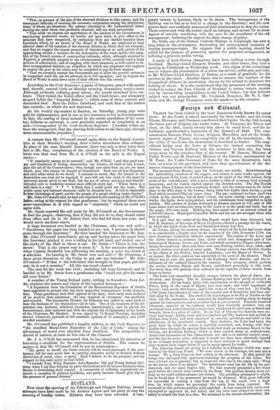SCOTLAND.
Ever since the opening of the Edinburgh and Glasgow Railway, annual attempts have been made by Sir Andrew Agnew and his party to stop the running of Sunday trains. Hitherto they have been outvoted. A tem-
porary victory is, however, likely to be theirs. The management of the Railway was so bad as to lead to a change in the directory; and the new powers have now suddenly announced their determination to stop the trains. Those conversant with the matter smell an intrigue, and accuse Sir Andrew Agnew of secretly combining with the new for the overthrow of the old management; bartering his support for their change of policy.
Dr. Gillis, one of the Roman Catholic Bishops in Edinburgh, has sent • long letter to the newspapers, deprecating the contemplated cessation of Sunday passenger-trains. Ho suggests that a public meeting should be called for the purpose of protesting against the proposed arrangement, as inflicting a grievous public wrong.
A party of Anti-Slavery champions have been making a tour through Scotland. Having visited Glasgow, Dundee, and other towns, they held a meeting in Edinburgh on Wednesday week. One object of the assemblage was to witness the presentation of a silver tea-service, coffee-pot, and tray, to Mr. William Lloyd Garrison, of Boston, as a mark of gratitude for his services in the cause. Another object was to censure the conduct of the Evangelical Alliance in sanctioning slavery by the refusal to denounce the holding of slaves. It is also understood that the promoters of the meeting wished to induce the Free Church of Scotland to return certain monies sent by slaveholding sympathizers in the United States; but that delicate subject was not propounded. Mr. Frederick Douglass, Mr. W. L. Gar- rison, and Mr. George Thompson, were the speakers on the occasion.


























 Previous page
Previous page